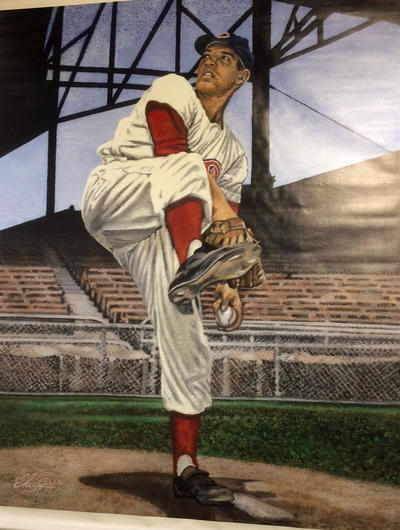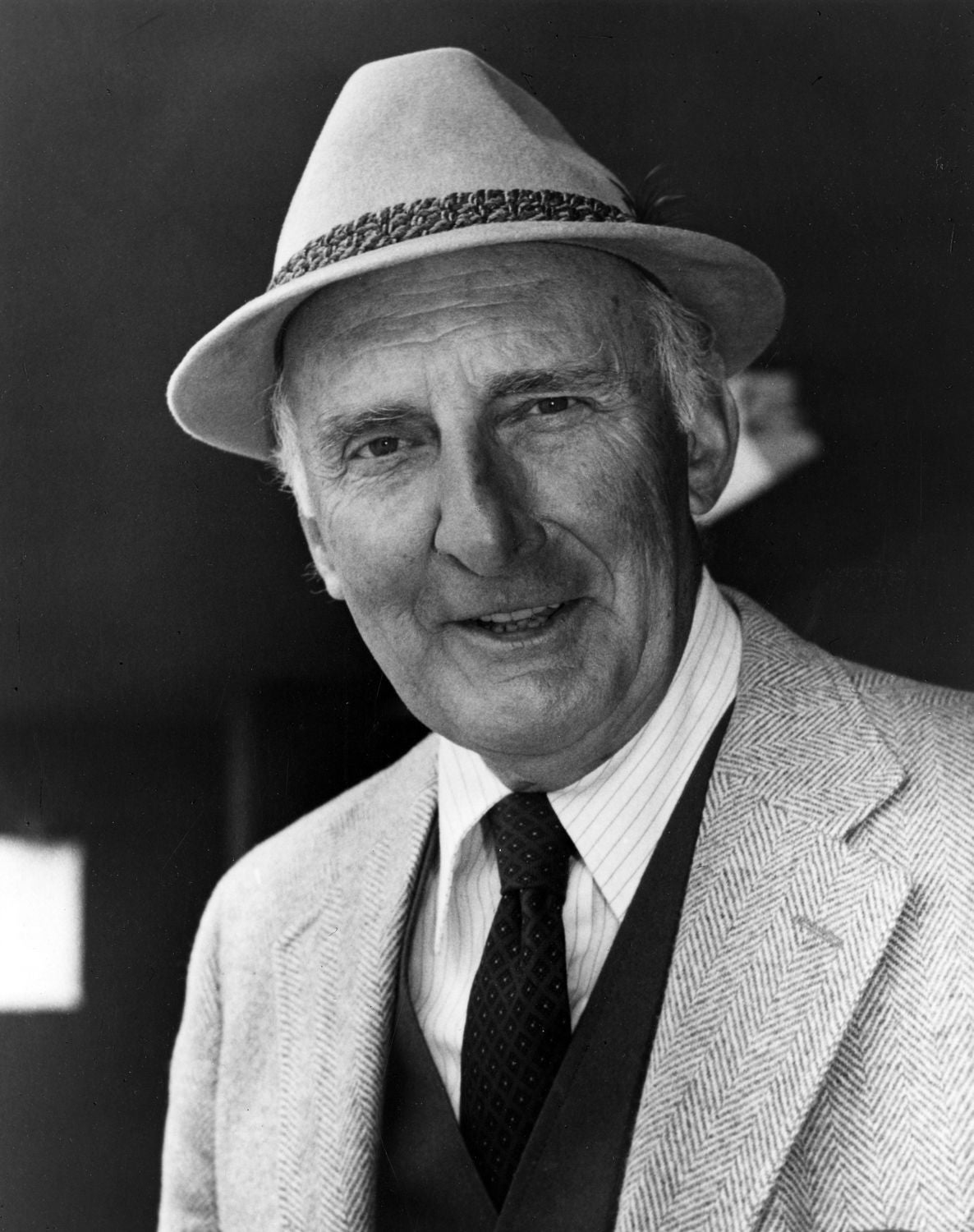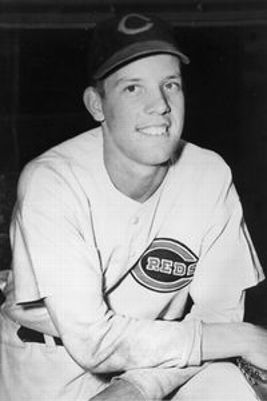"Freedom is never more than one generation away from extinction. We didn't pass it to our children in the bloodstream. It must be fought for, protected, and handed on for them to do the same, or one day we will spend our sunset years telling our children and our children's children what it was once like in the United States where men were free." - President Ronald Reagan
Monday, June 10, 2024
Did Dobbs abort the Left's common sense?
Did Dobbs abort the Left's common sense? - American Thinker https://t.co/7bjFlQHSl7
— Silvio Canto. Jr. (@silvio_canto) June 10, 2024
June 10, 1944: The summer when a 15‐year‐old played ball

Most Americans were consumed with World War II in June 1944. It started with D-Day and the daily reports of Allied forces marching into France. It was personal for most families, because every street had one or two young men fighting in Europe or the Pacific.
The baseball season went on, as President Roosevelt desired. However, the teams had to get very creative to fill their rosters. They could not rely on Latin players as they do today, and African Americans could not play anyway. I should add that a lot of Cuban young men served in World War II in support of U.S. forces.
On June 10, 1944, the Cincinnati Reds gave the ball to Joe Nuxall, and history was made:
In 1942, after the Japanese attack on Pearl Harbor, President Roosevelt wrote to Baseball Commissioner Kenesaw Mountain Landis to ask that baseball continue even though the United States was going to war:Nuxall went into the radio booth after baseball and worked on Reds games for a long time. In fact, I remember catching Reds games on WLW out of Cincinnati. They came in clearly at night. It also made for good company the few times that I drove on the Ohio Turnpike going back to Wisconsin.
“I honestly feel that it would be best for the country to keep baseball going. There will be fewer people unemployed and everybody will work longer hours and harder than ever before. And that means they ought to have a chance for recreation and for taking their minds off their work even more than before.”
Landis obliged, and play continued even as the stars of the era left to enroll in the armed forces. Detroit Tigers first baseman Hank Greenberg was among the players who had enlisted even before 1941, in the prime of his Hall of Fame career.
After the 1942 season, more than 500 big league players enlisted, including stars Ted Williams, Joe DiMaggio, Bob Feller, Dom DiMaggio and Pee Wee Reese.
Meanwhile, the major leagues had to make do with whoever was available, and the 15-year-old Nuxhall was just one of many new players who normally wouldn’t have come close to a shot at the big leagues.
Others included Pete Gray, a one-armed outfielder who hit .218 and drove in 13 runs in 77 games with the St. Louis Browns in 1945, and 16-year-old Carl Scheib, who pitched for the Philadelphia A’s in 1943.
Eighteen-year-old Vern Benson got to hit twice for the A’s that year, while 17-year-old Cass Michaels began his 12-year major league career many years ahead of schedule playing third base for the White Sox.
Older players also got in on the act: Mike Ryba and Al Simmons were among the former major leaguers who returned to fill in for their younger counterparts overseas.
As for Nuxhall, though the June 10 outing was his only appearance in 1944, he rejoined the Reds in 1952 when he was 23 years old and pitched 15 seasons in the big leagues. He ended his career with a 135-117 record and a 3.90 ERA.
Nuxall died in 2007.
Let's remember the many who served and came home to make the game greater than ever.
Happy # 77 Ken Singleton
Ken came to Baltimore in 1975 in one of the biggest trades in the team's history: Dave McNally and Richie Coggins to Montreal for Ken Singleton and Mike Torrez.
Singleton was one of the key players in the teams that won the AL pennant in 1979 and World Series in 1983.
His best season was probably 1979: .295 average, 35 HR & 111 RBI.
After baseball, Ken went into the TV and radio booth.
We remember Judy Garland (1922-69)
On this day in 1922, Frances Ethel Gumm was born in Minnesota.....we know her as Judy Garland........She died in 1969......
P.S. You can listen to my show. If you like our posts, please look for ”Donate” on the right column of the blog page.
We remember Chuck Thompson (1921-2005)

The great Chuck Thompson was born in Massachusetts on this day in 1921.
A few years ago, I heard the news that Chuck Thompson died in Baltimore. He was 83.
Thompson was the Orioles radio announcer for a generation. He also did the Colts!
Chuck was a Vince Scully kind of announcer. He had that golden voice and sounded like he was having a one on one chat with the listener.
I remember staying up all night listening to Chuck Thompson call an Orioles' game from the West Coast.
Or driving around on a Sunday afternoon tuned to a Yankee-Oriole September pennant race game.
Or listening to my shortwave radio in Mexico City catching up with baseball on American Forces Radio.
I remember Frank Robinson's 500th home run!
Brooks Robinson's last home run, a game winner in '77!
It was great. So many memories courtesy of Chuck's wonderful voice!
It was so good that I would turn down the TV volume and listen to Chuck.
I never met Chuck Thompson personally but he touched many of us with his baseball play by play.
We remember Hattie McDaniel (1895-1952)
June 10, 1895: Hattie McDaniel was born in KS....first African American to win an Academy for "Gone with the wind".
P.S. You can listen to my show. If you like our posts, please look for ”Donate” on the right column of the blog page.
# 25: DiMaggio went 1-for-5 to keep the streak going.
P.S. You can listen to my show. If you like our posts, please look for ”Donate” on the right column of the blog page.
Joe Nuxall, the answer to a great baseball question
The Cincinnati Reds brought up a 15-year old rookie named Joe Nuxall. He became the youngest player in baseball history when he appeared on this day in 1944.
Secretariat, DiMaggio, and the teenager
(My new American Thinker post)
Once in a while, the crazy present makes you long for the past. I'm sure that people back then had their problems, but at least you didn't have a political party indicting the other party's likely nominee in the upcoming election. No banana republic back then!
So we remember this weekend in happier times.
Let's start with Joe DiMaggio who took his hitting streak to 25. Joe went 1 for 5 against Washington and the streak kept going. Wonder how many suspected on June 10, 1941 that it would go to 56? The record back then was 44.
Second, a few days after the D-Day invasion this week in 1944, a young man named Joe Nuxall made baseball history. Here it goes:
On the afternoon of June 10, 1944, just 3,510 individuals came out to Crosley Field for a contest between the Cincinnati Reds and the league-leading St. Louis Cardinals, who were working toward a third straight pennant.
Most of the fans probably showed up to see Stan Musial, the future Hall of Famer. What they saw was a little bit of history when Joe Nuxall came out of the bullpen to pitch for the Reds. He was a big young man, 6-3, 195 lbs. It went okay for the teenager that day as we remember:
Nuxhall joined the Reds roster, staying with them until school ended in June, reporting when night or weekend games were being played. He expected to just take things in and did so until the bottom of the eighth inning on Saturday, June 10. Nuxhall recalled, “…the Cardinals are just killing us; it’s thirteen to nothing. Finally Mr. McKechnie told me to go warm up. Really he yelled twice. The first time he said ‘Joe,’ I didn’t pay any attention, figuring he was talking to someone else. The second time it was a little louder, and I went down and warmed up.” But not before he tripped over the last step out of the dugout and fell flat on his face. Nuxhall continued, “Jeez God, I was scared to death. … I was throwing the ball all over the damned place.” Nervous or not, Nuxhall got the first batter he faced, George Fallon, to ground out to shortstop after going to a full count. Mort Cooper then received a walk. Augie Bergamo popped up to shortstop Eddie Miller. Then the realization of where he was hit him full force. The next batter was Debs Garms, the 1940 National League batting champion. Nuxhall threw a wild pitch, allowing Cooper to move to second, then walked Garms. Stan Musial came to bat and singled to load the bases. Nuxhall’s meltdown came in full earnest. He walked the next three batters, forcing in three runs, before second baseman Emil Verban singled in two runs.
With that, McKechnie came out to end Nuxhall’s agony, saying, “Well, son, I think you’ve had enough.” Jake Eisenhardt came in and walked Fallon before inducing Cooper to pop out to first.
Nuxhall faced nine batters, walking five, allowing two singles, throwing a wild pitch, and giving up five earned runs. Cincinnati went down in order in the bottom of the ninth.
Well, he could have done better but he was 15 and facing the mighty Cardinals. Joe was sent back to the minors and came back in 1952 and enjoyed a 16-year major-league career: a 135-117 pitching record, a 3,90 ERA and 83 complete games, or about what the entire league throws these days. After baseball, he called the Reds' game on the radio for 38 seasons, retired in 2004 and died in 2007. I should add that I remember him on the radio, especially in 1978 when I followed Pete Rose and his 44-game hitting streak.
Last, but not least, there is a horse, and I don't mean Mr. Ed.
Fifty years ago this week, everybody was watching a horse race and we were not disappointed. This is the story:
With a spectacular victory at the Belmont Stakes, Secretariat becomes the first horse since Citation in 1948 to win America’s coveted Triple Crown: the Kentucky Derby, the Preakness and the Belmont Stakes. In one of the finest performances in racing history, Secretariat, ridden by Ron Turcotte, completed the 1.5-mile race in 2 minutes and 24 seconds, a dirt-track record for that distance.
You need to watch the video, because it is unbelievable.
Too much politicization of the DoJ? Take a break and enjoy yourself with a little history this weekend.
P.S. Check out my blog for posts, podcasts and videos.






